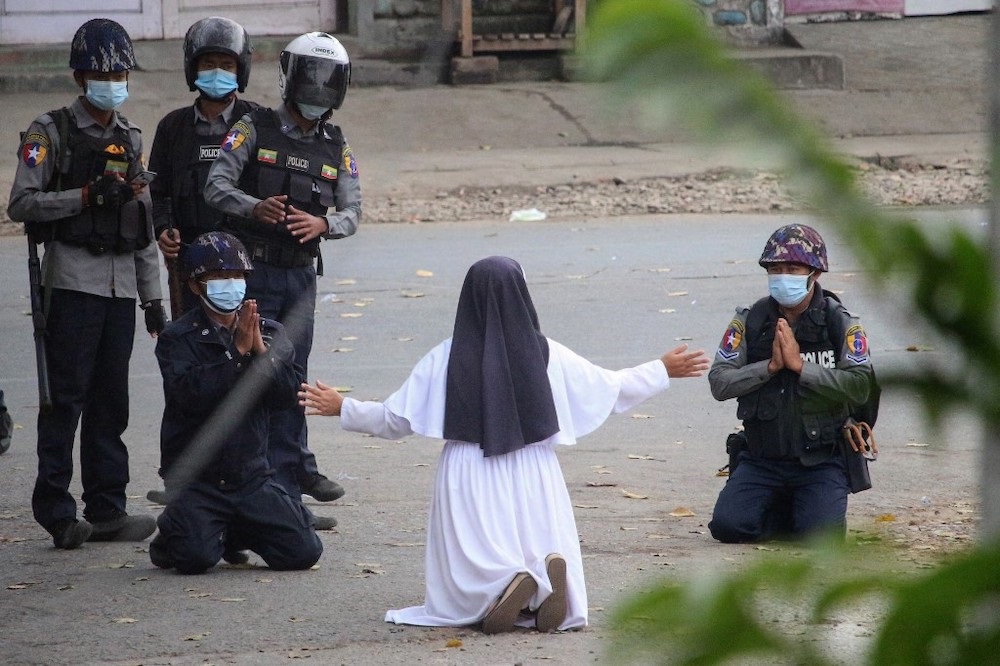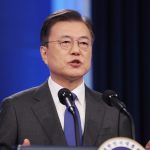
YANGON: One hundred days after the military seized power in Myanmar, the nun who pleaded for protesters on her knees in the street says the coup has cast a pall of fear and depression over the country.
The image of Sister Ann Rose Nu Tawng kneeling in the dust, arms spread, begging police not to shoot “the children” went viral in March as an uprising swelled in Myanmar.
Today, the 45-year-old nun works in a clinic in Myanmar’s northernmost Kachin state, tending to patients injured by security forces, sickened from stress, and even those who try to kill themselves.
“With the consequences of the Covid-19 pandemic and brutal actions of the military, there are more people who feel depressed and want to commit suicide,” she told AFP.
“People are living in fear and they feel hopeless.”
On Tuesday, 100 days will have passed since the generals made their lightning power grab in the early morning of February 1, ousting and detaining civilian leader Aung San Suu Kyi.
The period has seen Myanmar plunge into chaos as the army struggles to control widespread opposition to its rule.
Around 780 civilians have been killed, according to a local monitoring group, as security forces have sought to suppress near-daily protests with brutal crackdowns and live rounds.
While praised for her bravery months ago, Sister Ann Rose Nu Tawng said she thinks instead of the youths who are still fighting.
“They are sacrificing their lives for their future.”
Night after night, soldiers and police raid homes to arrest suspected activists — both protesters and those taking part in the civil disobedience movement that has crippled the state’s ability to function.
Despite the dangers, the movement persists, fuelled by a young generation who came of age since democracy dawned and the country began opening up a decade ago.
“We want to stand on the right side of history,” said a protester in Myanmar’s former capital Yangon.
‘It’s not going to quiet down’
The bloody intensity of the crackdowns has ebbed in recent weeks — partly as demonstrators have switched to flashmob tactics to avoid the risk of being shot.
But if the violence in Myanmar’s urban centres has slowed, clashes between the military and ethnic rebel armies in its border regions have intensified.
“It’s not going to quiet down,” said Yangon-based political analyst Khin Zaw Win.
“The regime thinks that everything will be okay by June, but it is a delusion.”
In eastern Karen state, the Karen National Union — who are sheltering dissidents fleeing to their territory — has captured military posts and been hit with multiple air strikes in return.
Clashes in northern Kachin state have also ticked up, and in a dramatic display of the rebel forces’ capabilities, last week the Kachin Independence Army shot down a military helicopter.
Several groups have come out in support of the anti-junta movement, even providing basic training to the young protesters.
But so far, calls for the disparate rebel factions to unite into a “federal army” have not borne fruit.
A group of ousted lawmakers, who set themselves up as a shadow “National Unity Government” (NUG), announced the creation of a “people’s defence force” to protect civilians from the military.
Details are scant and the NUG, whose members are in hiding, has not shown itself able to wield much influence.
But the junta on Saturday designated it a “terrorist group”, blaming it for “bombing, arson, manslaughter and intimidation to disrupt state administrative machinery”.
‘The people did not choose this’
So far neither calls for restraint nor United States, European Union and British sanctions have shown signs of deflecting the generals off their chosen course.
A summit of regional bloc Asean last month — attended by junta leader Min Aung Hlaing — yielded no more than a “five-point consensus” calling for dialogue, an end to violence and the appointment of a special envoy.
But even this limited achievement was undermined days later, when the junta said it would heed “suggestions” only when “the situation returns to stability”.
On the global stage, hard-hitting UN-level sanctions have been stymied by China and Russia, who say they would be counterproductive.
Myanmar’s economy — reeling as workers nationwide down tools rather than cooperate under military rule — is expected to contract by a staggering 10 percent in 2021, according to the World Bank.
And the UN Development Programme warned the combined effect of the pandemic and the coup turmoil could see nearly half of the population living in poverty by next year.
“The military has chosen the wrong moment to launch a coup and to face a civil war,” said analyst Khin Zaw Win, adding that they have “lost all public support”.
“The people did not choose this. It is the generals who did and they will pay the price.”


